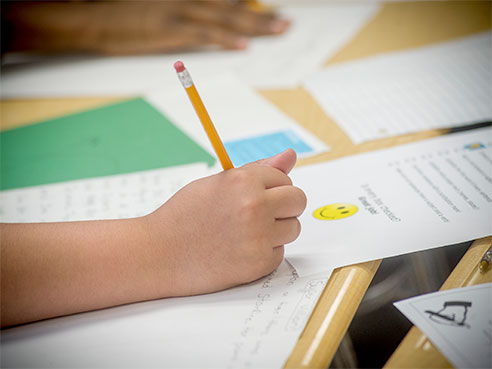Written by: Tiffany Westry
Need more info? Contact us
 Summer is in full swing: Beaches are crowded, parks are bustling, and school books are tucked away until August. But early childhood education experts at the University of Alabama at Birmingham caution that kids lose as much as two to three months of math and reading skills during the summer.
Summer is in full swing: Beaches are crowded, parks are bustling, and school books are tucked away until August. But early childhood education experts at the University of Alabama at Birmingham caution that kids lose as much as two to three months of math and reading skills during the summer.
A 2013 survey by the National Summer Learning Association revealed that, of 500 teachers, 66 percent said they spent three to four weeks at the beginning of the school year re-teaching previously covered material.
“There is a greater loss for math compared to reading,” said Jennifer Summerlin, early childhood education instructor in the UAB School of Education Department of Curriculum and Instruction. “It’s believed this is because children are still doing some functional reading during the summer, but don’t have any day-to-day encounters with math.”
Studies show that the loss over the summer is greater for children of low socioeconomic status, which puts them further behind at the start of the school year.
“Students from lower-income households learn at about the same rate as students from higher socioeconomic status during the school year, but the greater loss over summer break puts them at a disadvantage,” Summerlin said.
Summerlin and early childhood and elementary education Assistant Professor Deborah Strevy offer tips to help children retain what they learned during the school year.
| “Students who read 20 minutes a day typically score much higher on standardized tests, often in the top five percent. Twenty minutes a day of reading virtually anything will raise your child’s standardized test scores.” |
Read every day
“Simply having access to books isn’t enough,” Summerlin said. “Engage with your child. Asking questions about what they have read really helps hold them accountable for comprehending the text.”
Strevy says the magic number is 20. “Students who read 20 minutes a day typically score much higher on standardized tests, often in the top 5 percent. Twenty minutes a day of reading virtually anything will raise your child’s standardized test scores. It’s also important for parents to model how important reading is, whether it’s reading the newspaper, a magazine or an electronic book. Seeing parents take the time to read shows children reading is important.”
Let children choose the books and materials they are interested in to make reading seem less like a chore and more of a fun activity.
Play games
“It’s not just about working problems,” Summerlin said. “Play games to build number fluency and strategy. Help them use logic and reason.”
There’s an app for that
“Apps can be helpful, but some are just drills where children give information back without understanding,” Summerlin said. “Be sure to evaluate the apps. You really want kids thinking, so apps that are interactive and require problem-solving and reasoning are ideal. When choosing reading apps, look for ones where kids can choose their own adventure or create their own story. Apps that help them share information are the ones that they are going to go back to over and over again and build their skills.”
Conversation is key
“With so much information at our fingertips these days, it’s really the conversation, the accountability that helps push a child to keep thinking,” Summerlin said.
Balancing summer activities by including some enrichment is key to curbing summer learning loss. Summerlin recommends establishing a routine, even if it is before bedtime; spend some time reading, talking or playing a game, and have some designated time for conversation and engaging activities.